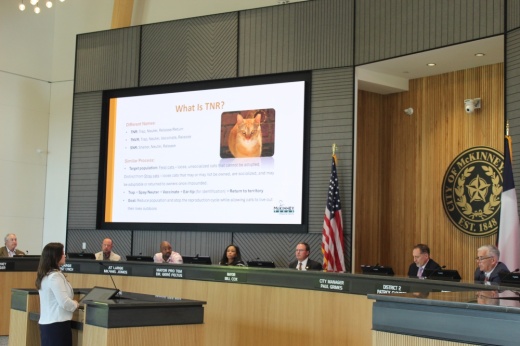City staff from McKinney’s Animal Services department brought the idea to McKinney City Council members during an Oct. 6 work session. Following a staff presentation and some discussion, council members voiced support for staff to put together different options for a potential program.
Those options are expected to be presented at a future council meeting, City Manager Paul Grimes said.
Current situation
Trap-neuter-release refers to trapping, spaying or neutering, vaccinating and ear tipping feral cats for identification before releasing them, Animal Services Manager Hannah Golden said. The target population is feral cats, which are different from stray cats, she said.
“A stray cat is going to be an owned animal or an animal that has potential to be owned and is socialized,” she said. “Feral cats are going to be unsocialized animals that have grown up outside and are by all intents and purposes a wild animal.”
The goal of TNR is to reduce feral cat population over time through spaying and neutering, according to the presentation.
McKinney’s current city ordinances would make TNR technically illegal to perform within the city, Golden said. Part of that is how the city defines an owner in its current ordinance.
A closer look
Golden’s presentation broke down potential benefits and challenges posed by a TNR program and included information on what neighboring cities are doing. TNR can stabilize cat colonies over time and reduce complaints about mating behaviors such as yowling and spraying, according to her presentation.
“What studies show is that you really have to get in there and you have to do it all quickly,” Golden said. “Within a breeding season, get as many cats, if not all of the cats in an area, spayed and neutered within one breeding season because if you don’t there will be kittens again next year.”
During discussion, council member Rick Franklin asked how many feral cats were in McKinney. Golden said the city does receive regular complaints about feral cats, but it's not citywide.
“There are specific pockets within the city, so it’s not citywide,” she said. “It’s specific areas where we’re seeing an influx in these animals, and typically it’s complaints of nuisance behaviors that we get.”
The cost
TNR programs are also resource-intensive, Golden said. Her presentation estimated it would cost more than $100 per cat for the complete TNR process. That total would include spaying or neutering and basic vaccinations, according to the presentation.
“You’ve got to have the manpower, you’ve got to have the money to take those animals to the veterinarian to be spayed, neutered, vaccinated,” she said.





